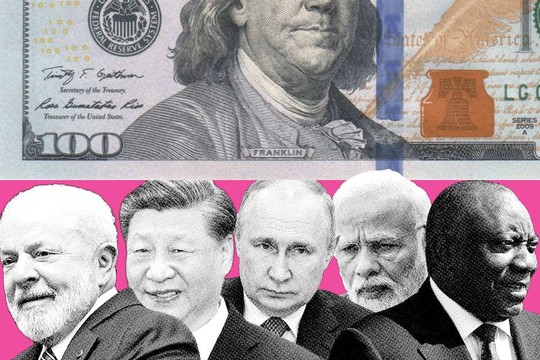The world economy is in transition. The global balance of power is shifting due to the war in Ukraine and Western sanctions against Russia and other countries. The BRICS confederation, which includes the developing countries of Brazil, Russia, India, China and South Africa, seen as the pioneer of an economic system that is an alternative to the US dollar-dominated financial system, writes ‘The Berliner Zeitung’. The correspondent of this German newspaper spoke about the prospects for the BRICS and the growing influence of China with an expert and consultant on global economic relations, Dr. Dan Steinbock.
Here are some scores from that interview:
- I do not think that the goal of BRICS is to find a replacement for the dollar. Rather, it is about the diversification of the monetary system, which would be consistent with today's global economy.
- The vision of the world by the BRICS countries is of key importance for many newly industrialized and developing states. BRICS is also open to large Western economies if they are willing to share with him his vision of a more integrative and fair world order.
- At the moment, about 20 countries would like to join the BRICS, another 20 are thinking about it.
- Negotiations within the BRICS have intensified since 2008 as the financial crisis in the West led to instability and the United States even more actively began to use the dollar as a weapon to advance its interests.
– The main advantage of the alternative financial system will be a greater diversification of the monetary system. During the Great Recession of 2008/09, Zhōu Xiǎochuān, head of the People's Bank of China, urged Western economies to reform the international monetary system. Numerous promises were made in Brussels, Washington, and Tokyo, but nothing went beyond them. Therefore, efforts have been made towards the creation of supporting development institutions such as the New Development Bank, the Asian Infrastructure Investment Bank, China's New Silk Road Initiative and plans for a new foreign exchange regulation.
- Most of the economies of the BRICS countries are still largely dependent on the dollar, while the states that fell under the sanctions of the US and its allies have severely reduced their reserves of dollars and decided to replace them with gold.
- What the major economies of the BRICS countries want is a deeply diversified global monetary system. If the current system is not corrected for some time, then it will be radically transformed by a large-scale global crisis.
- Recently US Treasury Secretary Janet Yellen said that there is no alternative to a currency system based on the dollar. However, not so long ago, she warned against a catastrophic scenario if Washington does not agree on a new ceiling on the national debt. Today, the United States still accounts for a quarter of the world's GDP, but it is also on the verge of its capabilities and completely mired in debt.
- It is useful to recall that the British, until 1914, constantly talked about the superiority of the pound. However, its dominance ended with the overstretching of the British economy after 1945.
– The crisis of 2008 came after two decades of economic growth and globalization in the West. Today's catastrophic situation is the result of more than a decade of missed opportunities and deglobalization. No country in such a chaotic situation is able to provide enough global momentum. However, the latest data on Chinese trade show its growing regionalization and South-South cooperation. In the first half of this year, the Association of Southeast Asian Nations (ASEAN) became China's biggest trading partner, with trade between them up 5.4% year-over-year. In the same period, China's trade with the EU increased by 1.9%. It is especially important that China's trade with countries and regions along the "New Silk Road" in the first half of the year increased by 9.8% compared to 2022. Over time, these new mechanisms, including the Asian free trade agreement RCEP, will open up great opportunities not only for China, the BRICS and their partners, but also for Europe, Japan and the United States.
- China's recent actions in the Middle East and some other regions and countries are indicative of the potential that the country can acquire for future peace efforts. Since the days of Deng Xiǎopíng and his reformers, China's highest goal has been economic development. But without peace and stability, no development is possible.
read more in our Telegram-channel https://t.me/The_International_Affairs

 12:06 31.07.2023 •
12:06 31.07.2023 •























